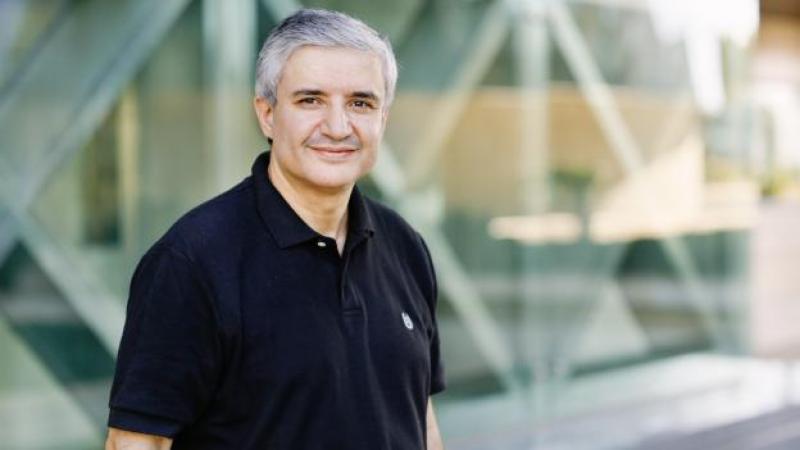By David Murphy
Muhammad Mustafa Hussain, KAUST professor of electrical engineering, was recently elected as an Institute of Electrical and Electronics Engineers (IEEE) Fellow, effective January 1, 2020, for his “contributions to flexible and stretchable electronic circuits.” Hussain joins a select group of recipients, with the total number of Fellows selected in any one year not exceeding 0.1% of the institute’s total voting membership.
Of his prestigious acknowledgement by the IEEE, Hussain noted, “I feel humbled, honored and happy at the same time. I am deeply grateful to my family, my past and present research group members, colleagues, and mentors. I am sincerely appreciative of Professor Mohamed-Slim Alouini, as he educated me on the process, which played a critical role in my elevation. Finally, I am especially thankful to the Dean of the University of California, Berkeley College of Engineering, Professor Tsu-Jae King Liu for nominating me.”
Augmenting the quality of life with the technology of tomorrow
Before joining KAUST and the Computer, Electrical and Mathematical Sciences and Engineering (CEMSE) Division in 2009, Hussain completed both his master’s degree and Ph.D. in solid-state electronics within the area of electrical and computer engineering at The University of Texas at Austin. He is currently the principal investigator of the KAUST Futuristic Electronics and Integrated Nanotechnology Lab and the principal ideator of the KAUST FabLab and vFabLab™.
Hussain—whose research area is in the field of transformational electronics—seeks to introduce new applications for web integrated interactive electronics using complementary metal-oxide-semiconductor (CMOS) compatible processes. In the past, his research has focused on using traditionally reliable, but physically rigid, electronic materials for flexible and stretchable electronic applications. As an emerging area of electronic applications, the concept of flexible and stretchable electronics has centered around naturally flexible and stretchable materials which can potentially be used as electronic applications.
“I am deeply passionate about trying new things, and I find that electronics is a great tool for that. In the last twenty-five years, we have experienced a profound impact of information technology enabled by CMOS electronics, which are physically rigid. Going forward, we will see more and more integrated CMOS electronic systems as multi-functional Internet of Things (IoT)/Internet of Everything (IoE) devices for varied applications ranging from automation, robotics, safety, to healthcare.
“The ultimate success of these electronics will depend on their cost-effectiveness because, as of today, half of the world’s population does not have any access to any of them due to limited affordability. Therefore, it is important to keep all these intriguing complexities in mind while designing CMOS electronics for future applications. As a researcher, I focus on all these aspects simultaneously to provide the most comprehensive solution to existing challenges or innovate new applications, which can significantly augment the quality of our life.”
A passion for the technological empowerment of humanity
With an unwavering passion for technological empowerment, particularly regarding CMOS electronics, the overarching goal of Hussain’s research is for the world to realize and benefit from interactive, freeform, and democratized technology. He firmly believes that due to the comprehensive nature of his work, along with the constant demand for the latest innovative digital technologies, he will continue to create research that not only benefits Saudi Arabia but society as a whole. Hussain’s near-term goal is to ensure that his team’s lab innovations will continue to adopted by various industries and partners.
“We are the only group in the world who in the last seven years have built an exclusive program which can make a fully flexible and stretchable electronic system with the same performance and reliability like that of a traditional electronic system. Many of our lab applications have been adopted by non-electronic industries who are global leaders in their respective products.
“The impact of CMOS research is not only in Saudi Arabia but is also resonated all over the world. For example, the Kingdom could not have enjoyed its global stature if it did not trade oil globally. Therefore, now more than ever, KAUST should be globally competitive and impactful. I have goals to release some products which will reflect “Innovated in KAUST” and “Made in KAUST” slogans.
“I am categorically systemizing integration by simplifying complex engineering: not only through research but also through democratizing of electronics using advanced educational tools and technologies. Due to the world that we live in, I will continue my research in the same direction and will keep inspiring others.”
Hussain feels that his peers within the University should not take the innovative environs of KAUST for granted and that they should continue to invest in their academic reputations to ensure that the University attains its founding goals and objectives.
“The surreal academic infrastructure and research resource that we have here is unmatchable. However, we should not be complacent. We are already ten years old, and everyone is watching us both in the Kingdom as well as the international scholarly community (both in academia and in industry). We have to be far more competitive than we are today. Every single faculty has to be one of the top five global leaders in their respective fields. They will need to build their reputation(s) and draw talented students and postdocs, so they become the most desired candidates by global academic and industrial giants.”
